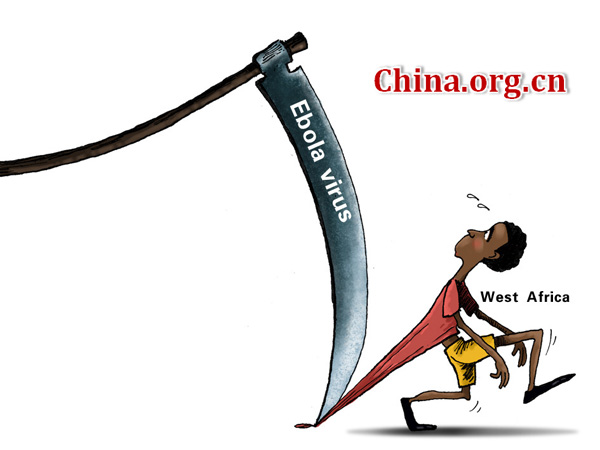Beating Ebola needs global collaboration
 0 Comment(s)
0 Comment(s) Print
Print E-mail People's Daily Online, August 7, 2014
E-mail People's Daily Online, August 7, 2014
|
?[By Zhai Haijun/China.org.cn] |
Mankind is in a race with the fast-spreading Ebola epidemic. The WHO (World Health Organization) has pointed out that the virus is moving faster than the control efforts. Since a new round of outbreaks in Guinea this February, the epidemic has developed to its widest-ever scale. In Guinea, Liberia, Sierra Leone and Nigeria, the Ebola virus has taken over 800 lives.
How could the Ebola virus, which was discovered as early as 1970s, pose such a formidable challenge even today? Researchers give three reasons: first, the acceleration of population mobility; second, the backward epidemic prevention systems in West African countries; and third, the weak prevention mechanisms of human society when facing non-traditional security issues such as the outbreak of an epidemic.
The Ebola epidemic has sounded the alarm to the world. Along with the progress of globalization, the world has never been so closely connected.
The Ebola epidemic appeared to be the problem of certain less developed countries at the beginning. However, in today's global village it could rapidly develop into a global issue.
Beating Ebola needs global collaboration. Currently, West Africa has a very limited ability to curb the epidemic. The international community has to increase its aid in epidemic tracking, epidemic detection, laboratory support and other areas. Donald Kaberuka, president of the African Development Bank, has called for more emergency aid to affected countries. The Red Cross Society of China has provided emergency medical supplies and humanitarian aid in cash to Guinea. Meanwhile, Chinese medical teams in those countries are also participating actively in the prevention and cure of the disease.
The overall socio-economic development of West Africa has been hit hard by the epidemic. A ban on tourism and the closure of border crossings are necessary measures, but the local economy is suffering.
In the long run, the improvement of the global epidemic prevention system needs the collaboration of all countries in building medical health systems, overall economic development strategies, foreign policy and other areas. The Ebola epidemic has reminded us that in the process of economic globalization, countries and regions that are marginalized will eventually restrict global stability and development in other ways. In this sense, it is not only an issue of how to help West African countries curb the epidemic and build a comprehensive epidemic prevention system, but also an issue of how to better share the fruits of globalization with those countries.






